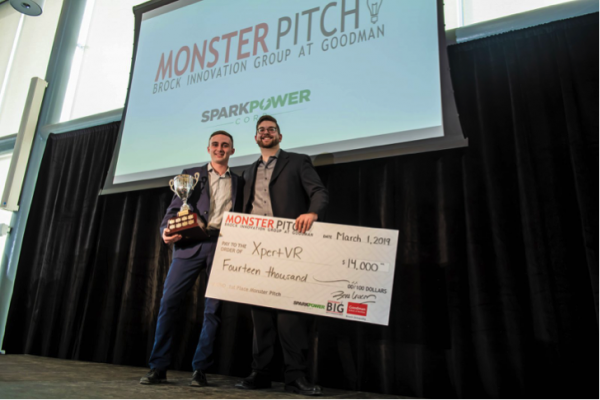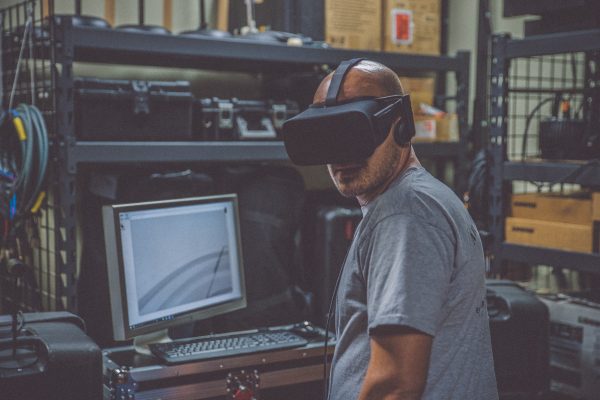The entertainment industry is one of the fastest growing industry globally. Virtual reality is a small part of that. It may be a small part today, but many has projected that Virtual reality is the future of entertainment. Not only that, but VR can also be very useful for educational purposes.
Virtual reality gives user realistic images, sounds and other sensations. All to simulate physical presence in an artificial world. There are many reasons why VR technology can become as universal as a smartphone. To better understand the industry and its prospect for success, Onside Media spoke to Evan Sitler from XpertVR.

Xpert VR, is a Niagara Region, Ontario based startup focusing on VR/AR development through software development, hardware sourcing, data collection and many other fields that promise to provide the best user experience for consumers.
Q: We understand that there has been a large spike of public interest in the VR industry and its application. Can you elaborate on the reason behind such event and will this growth be sustainable ?
Evan Sitler: The recent spike in public interest around VR will most definitely continue to grow because of multiple factors but more specifically 2 major factors. This boils down to the amount of positive research findings coming from the technology/related practical use cases and the growth of consumer ready headsets like the Oculus Quest 2.
First there have been many research studies published over the past 4 years that show the benefits of VR like the Seeing is Believing or VR Soft Skills studies by PwC. These studies show the economic as well as the individual impacts VR is already having and will have into the future. From $1.5 Trillion being added to the global economy by 2030 to a 275% average increase in confidence between a VR learner vs a classroom learner. Plus other research that extends into the benefits of VR for training, customer service, planning, job efficiency, gaming, and understanding human behaviour in industries across the board. This is leading to practical use cases in every industry around the world and will continue to grow as more companies adopt VR and their employees become more familiar with the technology.

A second factor increasing the adoption rate of VR is the ease of use and availability of hardware. Over the past year and a half this area has improved drastically with Oculus releasing the Oculus Quest 1 and recently the 2. This headset is completely wireless, doesn’t require anything beyond the two controllers it comes with (sometimes optional using hand-tracking) and has been built to be consumer friendly. As more options continue to enter the market we will see more and more consumers buying these headsets to play games and then realise the other practical use cases it offers. In the not so distant future consumers will have access to an almost unlimited library of games, training simulations, health services and more, allowing them to do things today people only dream of. Picture being able to bring any dream of yours to life virtually or learning any skill through hands-on virtual lessons that then translate into Augmented Reality instructions when you go to apply those skills.
Q:Very interesting, regarding the current social situation, what opportunities might the industry have during the new norm of pandemic social distancing ?
Evan Sitler: There are many practical use cases for VR technology with the new norm we have become accustomed to because of COVID-19. To give just a few examples, Spatial.io is a 3D meeting space that allows for teams to interact and collaborate like they would in the real world but with the added benefit of 3D models and infinite screens/writing space, Engagevr.io is a classroom application that allows teachers to create 3D lesson plans, taking students to Mars, back in time or into microscopic organisms, Population One is a game similar to Fortnite except you are the character in the game so you can exercise by playing, and the Research Access Portal is a website that gives researchers the tools to create VR simulations and run research with them remotely.
All of these new solutions being driven forward because of COVID-19 pull from traditional solutions/ideas from the industry they are a part of but add features only VR can offer. And because the features VR offer are so realistic and benefit every use case ten fold it is easy to see how this technology will be the next computer system.

Q: Do you think more manufacturers would move toward an all-in-one set of experience similar to Oculus with their Quest device line up ?
Evan Sitler: I believe that many manufacturers will move towards specializing in one specific niche or vertical as VR affects many industries and each one needs specific features to be available. Oculus has done a great job of this by creating the Oculus Quest and marketing as the consumer headset for entertainment. In contrast, Varjo has also done a great job in creating a headset for the highest end training and research. This is a headset that is used by NASA and has very different features and functionality compared to the Quest, like precision eye-tracking, human eye level resolution, high-end hand-tracking and more. It would be impossible for a manufacturer to compete in all of these markets so it makes sense that they are specializing. Hopefully as Augmented Reality (AR) continues to become more mainstream we will see headsets that combine both AR/VR so it’s seamless to switch between the two. With that said I believe this type of headset is still a ways off and once it does come I think there will still be low-end, high-end and enterprise headset solutions.
Q: What does the future of the VR industry look like to XpertVR ?
Evan Sitler: At XpertVR we understand that data runs the world today but believe that it hasn’t been handled very well by large companies up until this point. This becomes even more important when we look at the future of data and data protection as VR data allows you to read human emotions, uniquely identify people through how they move, understand what draws someone’s attention and so much more. Combining multiple data points then allows you to understand someone’s likes, dislikes, aspirations, fears, possible future diseases and a whole library of other information.
In the right hands this data could work towards solving world issues, diagnosing deadly diseases before it’s too late or even as simple as giving someone an uniquely entertaining experience. But in the wrong hands the data could be used to manipulate consumers buying behaviour, voting decisions, insurance rates, and much more. This is why at XpertVR we are developing leading edge data collection and visualization tools while at the same time building a rich network of VR headset owners that have complete control over what data is collected on them while they’re in VR, where it goes, who can use it and for what purpose.
With our network and clients beginning to use these tools we picture a not-so-distant future where everyone has complete control over their data and when they share it with those they trust they are rewarded with incredible experiences they used to only dream of.
For more information : https://www.xpertvr.com/
Cover Picture: Photo by Christine Sandu on Unsplash

Author: George Tran, Content Writer, Onside Media, TO, Canada. He is currently based out of Hanoi,Vietnam. If you have stories to share kindly email: – georgetran.onside@gmail.com





